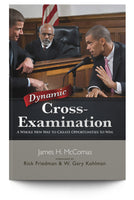Description
Description
Imagine a cross-examination technique that can consistently destroy a witness's credibility, elicit surprising answers, and create the powerful moments that win hard cases. Imagine a strategy that allows you to easily control hostile witnesses and get exactly what you want from them—support for the crucial points of your case.
Dynamic Cross-Examination rejects the old adage that you must never ask a question to which you do not know the answer. Instead, this book reveals the importance of remaining flexible and being unafraid to take risks. Author James H. McComas, an attorney well known for winning seemingly impossible cases, explains that taking a more creative approach to advocacy opens the door to achieving much greater success.
By mixing leading and non-leading questions, closely monitoring a witness's behavior, maintaining a fluid and energetic pace, and adapting your line of questioning to take advantage of unexpected responses, you can create and seize opportunities to drive your points home during cross-examination. That is why Rick Friedman, in his foreword to this book, affirms that he has used McComas's method in every cross-examination he has conducted over the past twenty years.
In this straightforward book, McComas leads you through nine case studies that demonstrate the effectiveness of his Dynamic Cross-Examination technique in civil and criminal cases. Insightful commentary accompanies each transcript, offering you concrete examples of how to elicit opportunities to win from a witness, discredit eyewitness and expert testimony, effectively use in-court demonstrations, handle objections, and deliver killer comebacks.
As McComas shows, the key to winning a tough trial is using cross-examination to promote your own case, while undermining your opponent. Dynamic Cross-Examination gives you the confidence you need to think on your feet and get exactly what you want from witnesses.
Author
Author
Details
Details
Paperback: 479 pages; First edition (2011); ISBN: 978-1941007709
Publisher: Trial Guides, LLC
Table of Contents
Table of Contents
- Foreword by Rick Friedman
- Foreword by W. Gary Kohlman
- Introduction
- Part I: Comparing Methods Calls for a New, Dynamic Approach
- What Is the Purpose of Cross-Examination?
- Cross-Examination: Art or Science?
- The Modern Yes-No Method of Cross-Examination
- The Method Matters a Lot
- The Dynamic Method of Cross-Examination
- How Do You Do Dynamic Cross-Examination?
- Part II: Case Example: State v. Peter Piper
- Introduction State v. Peter Piper
- Preparing for Dynamic Cross-Examination of Quarrel Kwiktrigger
- Dynamic Cross-Examination of Quarrel Kwiktrigger
- Preparing for Dynamic Cross-Examinatino of Sucha Snitch
- Dynamic Cross-Examination of Sucha Snitch
- Part III: Dynamic Cross-Examination for Plaintiff's Lawyers in Jury-Trial Cases
- Comparison of Cross-Examination in Plaintiff's and Criminal Practice
- Introduction to Jones v. Bigshot
- Dynamic Cross-Examination of Bertha Bigshot, MD
- Preparation for Ugit Nottabuk, PhD, Neuropsychologist
- Dynamic Cross-Examination of Ugit Nottabuk, PhD
- Part IV: Final Issues Concerning Cross-Examination
- Analytical Charts and Visual Aids
- Handling Special Cross-Examination Problems
- Maxims for Attorneys for the Underdog
- Conclusion
- Appendices
Free Chapter Sample
Free Chapter Sample
What Legal Leaders Are Saying
— Rick Friedman, author of Rules of the RoadI feel safe in saying you hold in your hands a book that will revolutionize how generations of trial lawyers think about cross-examination.
— Phillip Weidner, BS, MIT’s Sloan School of Business and JD, Harvard Law SchoolJames McComas, skilled trial lawyer and master of cross-examination that he is, has ‘nailed it’ in Dynamic Cross-Examination.
— W. Gary Kohlman, Champion MagazineThis book—an absolute must-read for aspiring and seasoned trial lawyers alike—pulls the curtain wide open to reveal why some cross-examinations succeed while others fail. More fundamentally, McComas shows why some criminal defense and plaintiff’s attorneys are successful in difficult cases, but others are not. Imagine a book that explains how Bob Dylan strung his lyrics together, or one that reveals how Hank Aaron could distinguish in a millisecond a fastball from a curve. Those books remain to be written, but McComas has given attorneys the equivalent in the area of trial practice.
— George N. Sidiropolis, Esq.As more and more witnesses of corporate defendants are trained by professional consultants, it is increasingly important to familiarize the lawyers in your firm with the lessons, techniques and strategies James McComas shares with his readers. Dynamic Cross-Examination has fundamentally changed the way I think about cross-examination. It is a book that you will read and continue to reference again and again. I can not overstate the importance of this book to your trial practice. It is truly one of the great books on trial advocacy. In my opinion, McComas’ Dynamic Cross-Examination is the leading resource on conducting effective cross-examinations. Buy this book and read it before your next cross-examination.
— Anthony T. DiPietro, Esq., atdlaw.comI recently purchased Jim McComas’s book on Dynamic Cross-Examination and found several items in the book to be extremely helpful. First, Jim’s suggestion about how to prepare for trial, and the importance of identifying the issue that will ‘determine the outcome’ of the case is spot on. I can’t stress how much this helped me focus on winning. In the past, I used to elevate my ‘theme of the case’ over what is most important—what is the one fact that I must prove in order to win. In a recent case I tried, the one issue I needed to prove wasn’t that there was medical malpractice by the doctor. It was that a certain medical condition (a dissecting aortic aneurysm) actually existed at the time my client went to see the doctor. I had to first prove this condition existed, before I could even begin to argue it was malpractice to miss it. As a result, I began nearly every cross examination with questions specifically about this issue and whether the defendant and defense experts agreed that the dissection was there when the patient went for medical treatment. I also want to thank Jim McComas for debunking that old myth about how an attorney should never ask a question that she/he doesn’t already know the answer to. I won’t repeat the whole story that’s in his book, but I liked Jim’s very common sense approach to discrediting that false tenet. Before reading Dynamic Cross-Examination, I used to think that it was my job to ‘control the witness’, and only ask leading questions so that he/she couldn’t say anything that would hurt my case. But after reading Jim’s book, I now view it as my job to be able to think on my feet and point out why the defendant’s self serving answers (which we all know are going to come) aren’t true. As a result, I set out to perform a dynamic cross-examination similar to how I would perform a regular deposition: without any fear of the answers that I might get, and with the confidence that I knew the medicine and records well enough to disprove anything the witnesses might say that was not consistent with the truth. And much to my surprise, by asking a rather open-ended question, one of the defense experts admitted the issue that I believed would ‘determine the outcome’ of the case (that the dissection was present at the time of the visit). The net result is that Jim’s techniques helped me to procure a $3.4 million verdict in a wrongful death case on behalf of a very deserving family. Thank you Rick Friedman and Jim McComas!
— Hank Asbill, partner, Jones Day, fellow and past president of the American Board of Criminal Lawyers, recognized by the National Law Journal as one of the nation’s top winning litigatorsDynamic Cross-Examination is a milestone analytical advancement in trial advocacy.
— Angela J. Davis, professor of law at American University, former director of The Public Defender Service in Washington, D.C.Jim McComas takes cross-examination to another level in Dynamic Cross-Examination. Beautifully written by one of the best trial lawyers in the country, this book is a must-read for all serious trial lawyers and a great text and sourcebook for anyone who teaches trial advocacy.
— Bob Muse, senior partner at Stein, Mitchell, and Muse, adjunct professor of law at Georgetown and Harvard Law SchoolsJim McComas is that rare lawyer who blends a towering intellect with unsurpassed practical experience. The result is an important and original book that will open your eyes and explain how successful cross-examination can be achieved. Mr. McComas’s insight, logic, and infectious passion will delight, inform, and challenge those who want to succeed in the well of the court. This book is a gem!
— Kim Taylor-Thompson, professor of law at the New York University School of Law, former director of The Public Defender Service for the District of ColumbiaMcComas debunks longstanding myths and draws on his extensive trial experience to create a provocative new framework for thinking about how to maintain leverage in cross-examination. What he does is offer the trial lawyer a new opportunity to win in the courtroom. It’s a must-read for trial lawyers and educators.
— Andrea D. Lyon, associate dean for Clinical Programs and director of the Center for Justice in Capital Cases at DePaul University College of LawJim McComas, one of the finest lawyers in the country, shares his valuable insights and methods with those of us who represent the underdog, and helps us all to be better advocates.
— Gregg O. McCrary, former supervisory special agent for the FBI’s Behavior Science UnitBased on his decades of experience and unparalleled wisdom, Jim McComas has created an innovative and powerful method for cross-examination. It will pull even the most experienced expert witnesses from the relatively safe harbor of the typical yes-or-no cross-examination into perilously unchartered waters, where any biases, flawed assumptions, and faulty reasoning are most likely to be exposed.
— Michele Roberts, Business Trial Lawyer of the Year, 2011 Chambers USA Awards of Excellence, listed in Washingtonian Magazine‘s 100 Most Powerful Women in WashingtonWhat Jim has coined in ‘Dynamic Cross-Examination’ is his spot-on identification of a method for successful interaction with your opponent’s witness. A must-read for trial lawyers.
— Cynthia Strout, Alaskan Champion of Liberty AwardIn my ten years of trying mostly murder cases with the author, I have seen this method create powerful and case-winning dynamics in the courtroom. It will change the way you practice. It is the next generation of winning trial technique.








